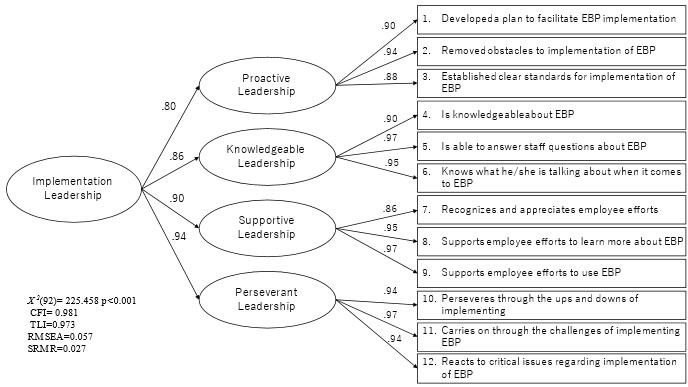Researchers validate the Japanese version of the ‘implementation leadership scale’ that can be used to promote evidence-based practice in Japan
In Japan, there is a growing interest in implementing evidence-based practice (EBP) to ensure the best possible care delivery. However, progress is slow and the implementation lags behind in the field of nursing. To accelerate the implementation of EBP, researchers have now developed a Japanese version of the implementation leadership scale to assess nursing managers’ strategic leadership in implementing EBP and effectively integrate research evidence into clinical practice.

Image title: Path diagram of the Japanese version of the Implementation Leadership Scale (ILS).
Image caption: Researchers from Japan show how evidence-based practice (EBP) requires identifying the readiness and processes necessary to institute EBP. Derived from the original ILS developed by Aarons et al.*, this version was developed to promote EBP in Japan and to enable international comparisons of leadership in clinical practice.
*Aarons, G. A., Ehrhart, M. G., & Farahnak, L. R. (2014). The implementation leadership scale (ILS): development of a brief measure of unit level implementation leadership. Implementation Science, 9, 1-10 (Figure 1).
Image credit: Ikuko Sakai of Chiba University
Image license: Original content
Usage restrictions: Cannot be reused without permission.
In nursing, evidence-based practice (EBP) entails providing holistic, high-quality care based on the most recent research and information rather than traditional methods or personal beliefs. EBP is viewed as the gold standard for delivering the highest standards in clinical practice and patient outcomes. Yet, there are several hurdles to EBP implementation. It is difficult for staff nurses to tackle the implementation of EBP on their own as they lack managerial skills. Nurse managers, on the other hand, can influence how team members cooperate to adopt EBP as well as the attributes of the workplace. As a result, strategic leadership in the workplace by nurse managers is a vital facet of EBP implementation.
The implementation leadership scale (ILS) assesses strategic leadership shown by managers in EBP implementation. It was originally developed by Aarons et al.* (University of California, San Diego) to implement EBPs in clinical settings and to develop successful intervention programs. However, the individual characteristics of managers that contribute to their ILS scores are not fully understood across the globe.
To help better integrate findings from research studies into clinical practice, Professor Ikuko Sakai and a team of researchers recently developed and validated a Japanese version of the ILS. The team is comprised of Masatoshi Saiki from Chiba University, Ai Tomotaki from Tokai University, Hiroki Fukahori from Keio University, Takeshi Yamamoto from Sapporo Medical University, Masakazu Nishigaki from International University of Health and Welfare, Chiyo Matsuoka from Konan Women’s University, and Emi Yasuda from the National Institute of Public Health. Their findings were published in the Journal of Nursing Management on October 23, 2023.
Prof. Sakai says, “The ILS has been translated into other languages like Chinese, Greek, and Norwegian, and this Japanese version will enable more international comparative studies.”
The ILS is available in two versions: one for self-assessment of managers and another for staff assessments. To create a Japanese version, the original ILS was translated into Japanese and was then given to the clinical nurses for review and to confirm if it was valid. Next, the Japanese ILS was distributed as a web questionnaire to 119 nurse managers and 2,858 staff nurses working in Japan to gather data on the strategic leadership demonstrated in EBP implementation.
The confirmatory factor analysis (CFA) was used to determine its construct validity or whether the Japanese version measures implementation leadership with the original construct. The CFA analysis helped the researchers understand how proactive leadership, knowledgeable leadership, supportive leadership, and perseverant leadership contributed to the strategic leadership of nurse managers.
For nurse managers, the validity of ILS was determined by comparing the scores based on their educational background (high school/vocational school/junior college/graduation) and experience in implementing EBP. The results showed that both versions of the Japanese ILS could satisfactorily gauge the strategic leadership of nurse managers and were reliable. “We found that nurse managers with more advanced education and experience with learning and working on EBP had higher ILS scores,” Prof. Sakai confirms.
The team is optimistic that the translated ILS will advance the development of educational programs designed to help implement EBP and help test their effectiveness. Prof. Sakai explains, “Research on EBP and its implementation is progressing slowly in Japan, but I’m confident the translated ILS will have a positive impact. It will expedite the transition from delivering patient care based on habitual practice to care that is the product of evidence gained from primary research.”
About Professor Ikuko Sakai
Dr. Ikuko Sakai is a Professor in the Department of Advanced Clinical Nursing at Chiba University, Japan. She received her nursing degree from Chiba University and her Ph.D. from The University of Tokyo. Prof. Sakai’s research interests focus on evaluating the outcomes of inter-professional education, nursing systems management, gerontological and community health nursing, and implementing evidence-based practice in rehabilitation units. She has published more than 100 publications consisting of peer-reviewed articles, books, and book chapters over the last two decades.
Funding:
This study was supported by KAKENHI (No. 19H03955) from the Japan Society for Promotion of Science.
Reference:
Title of original paper: Reliability and Validity of the Japanese Version of the Implementation Leadership Scale for Nurse Managers and Staff Nurses: A Cross-Sectional Study
Authors: Masatoshi Saiki1, Ai Tomotaki2, Hiroki Fukahori3, Takeshi Yamamoto4, Masakazu Nishigaki5, Chiyo Matsuoka6, Emi Yasuda7, and Ikuko Sakai1
Affiliations :
- Department of Advanced Clinical Nursing, Frontier Clinical Nursing, Graduate School of Nursing, Chiba University
- Faculty of Nursing, School of Medicine, Tokai University
- Faculty of Nursing and Medical Care, Keio University
- Department of Nursing, School of Health Sciences, Sapporo Medical University
- School of Nursing at Narita, International University of Health and Welfare
- Department of Nursing, Faculty of Nursing and Rehabilitation, Konan Women’s University
- Department of Health and Welfare Services, National Institute of Public Health
Journal: Journal of Nursing Management
DOI : 10.1155/2023/4080434
Contact: Ikuko Sakai
Graduate School of Nursing, Chiba University
Email: ikusakai@faculty.chiba-u.jp
Public Relations Office, Chiba University
Address: 1-33 Yayoi, Inage, Chiba 263-8522 JAPAN
Email: koho-press@chiba-u.jp
Tel: +81-43-290-2018
Office of Communications and Public Relations, Keio University
Address: 2-15-45 Mita, Minato-ku, Tokyo 108-8345 JAPAN
Email: m-pr@adst.keio.ac.jp
Tel: +81-3-5427-1541
Recommend
-

Towards a self-sustainable natural environment: The science of restoration ecology, where researchers engage in conversation with the earth
2023.02.02
-

Children-centered support and school operations: On the occasion of the founding of the Children and Families Agency
2023.02.15
-

Safeguarding Lifelines: Rapid Restoration of Infrastructure in Earthquake-Prone Japan
2024.10.21


